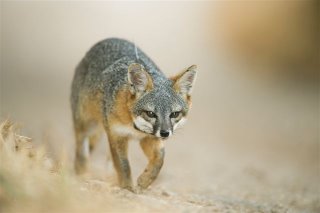Island foxes (Urocyon littoralis) are unique to the Channel Islands off the coast of southern California. But as we travel to different schools and communities we have run across a variety of names for foxes.
Foxes are the most diverse group of canines with various species found all over the world. There are arctic foxes that turn white in winter to blend in with the arctic snow. There are kit foxes and fennec foxes, adapted for deserts in North America and Africa, respectively. The red fox is found world wide (some populations being natural and others introduced by people).
Because various kinds of foxes are found all over the world, a word for fox appears in many languages. Here are a few that students have provided:
- zorro - Spanish
- daeb - Arabic
- Yu woo - Korean
- renard - French
- fuchs - German
- volpe - Italian
Foxes belong to the subfamily of animals called canines which includes wolves, dingos, African wild dogs, jackals, coyotes and domestic dogs. Canines originally evolved in North America. Many of the canines that we know today, however, are members of the family that migrated from North America to other parts of the world millions of years ago. Even the gray wolf is from a line of canines that migrated to Asia and then returned to North America.
The coyote (Canis latrans) and the gray fox (Urocyon cinereoargenteus), the ancestor of the island fox, never left North America. They are ancient species that lived side-by-side with saber-toothed cats and mammoths.
Island foxes have lived on the Channel Islands for at least 6,000 years. Friends of the Island Foxes urges you to explore our website and learn more about the island fox. The island fox only lives in one place in the world, on the California Channel Islands and each island has a different subspecies. To continue to survive into the future, the island fox needs your help.
A $10 donation will vaccinate an island fox against the threat of introduced disease: distemper and rabies.
To Donate CLICK on the Pay Pal or Network for Good button in the upper right corner.

